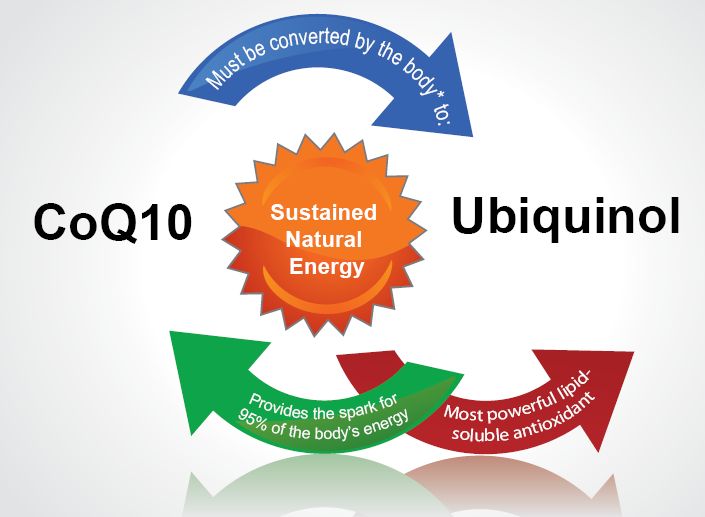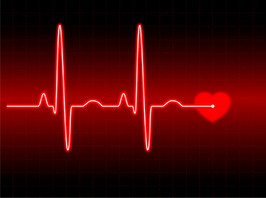More on the amazing CoEnzyme Q10 that our bodies produce….
 Here is some additional information about this wonderful nutrient our bodies create that increases energy production and helps to reduce inflammation.
Here is some additional information about this wonderful nutrient our bodies create that increases energy production and helps to reduce inflammation.
Tori Hudson, N.D., nationally recognized naturopathic physician, author, educator and researcher, has written much about this nutrient that is produced not only in humans, but in animals, plants and microbes. “It is an essential component of the mitochondria, which is the energy producing unit of each cell of our body. CoQ10 is involved in the manufacture of ATP, which is similar to the energy a spark plug provides in a car engine.” Our bodies cannot live without it, but the production declines with age and disease.
What medical conditions can be improved with CoQ10?

- Cardiovascular diseases such as congestive heart failure, high blood pressure, mitral valve prolapse, angina and coronary artery disease: 73% of CoQ10 patients improved their cardiac output and 92% (!) improved the pumping ability of the heart
- Diabetes: among other benefits, it may decrease how much insulin is needed
- Periodontal disease
 Immune system deficiency
Immune system deficiency
- Chronic Fatigue Syndrome
- Cancer: “because of its immune enhancing and antioxidant effects, CoQ-10 should be a strong consideration for cancer patients”
- Neurological disorders
So how much should we take? Dosage ranges from 60 – 300 mg each day though most studies have used 100 mg per day. “No serious adverse effects and no toxicities have been reported in studies lasting up to a year.”
Issues with medications: the cholesterol lowering drugs that are statins interfere with our body’s production of CoQ10. This is important to know if cardiac issues are involved. Some blood sugar lowering medications can reduce our production of CoQ10 as well.
If you are taking a blood thinning agent such as Coumadin, CoQ10 may reduce the blood thinning action which may require a higher dose of the Coumadin.
What do you think? If you would like to learn more, click on the link above. . .
Here’s to your health!
 Here is some additional information about this wonderful nutrient our bodies create that increases energy production and helps to reduce inflammation.
Here is some additional information about this wonderful nutrient our bodies create that increases energy production and helps to reduce inflammation.
Tori Hudson, N.D., nationally recognized naturopathic physician, author, educator and researcher, has written much about this nutrient that is produced not only in humans, but in animals, plants and microbes. “It is an essential component of the mitochondria, which is the energy producing unit of each cell of our body. CoQ10 is involved in the manufacture of ATP, which is similar to the energy a spark plug provides in a car engine.” Our bodies cannot live without it, but the production declines with age and disease.
What medical conditions can be improved with CoQ10?

- Cardiovascular diseases such as congestive heart failure, high blood pressure, mitral valve prolapse, angina and coronary artery disease: 73% of CoQ10 patients improved their cardiac output and 92% (!) improved the pumping ability of the heart
- Diabetes: among other benefits, it may decrease how much insulin is needed
- Periodontal disease
 Immune system deficiency
Immune system deficiency
- Chronic Fatigue Syndrome
- Cancer: “because of its immune enhancing and antioxidant effects, CoQ-10 should be a strong consideration for cancer patients”
- Neurological disorders
So how much should we take? Dosage ranges from 60 – 300 mg each day though most studies have used 100 mg per day. “No serious adverse effects and no toxicities have been reported in studies lasting up to a year.”
Issues with medications: the cholesterol lowering drugs that are statins interfere with our body’s production of CoQ10. This is important to know if cardiac issues are involved. Some blood sugar lowering medications can reduce our production of CoQ10 as well.
If you are taking a blood thinning agent such as Coumadin, CoQ10 may reduce the blood thinning action which may require a higher dose of the Coumadin.
What do you think? If you would like to learn more, click on the link above. . .
Here’s to your health!






Recent Comments